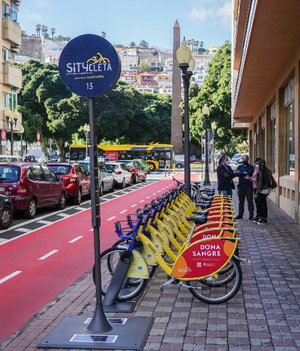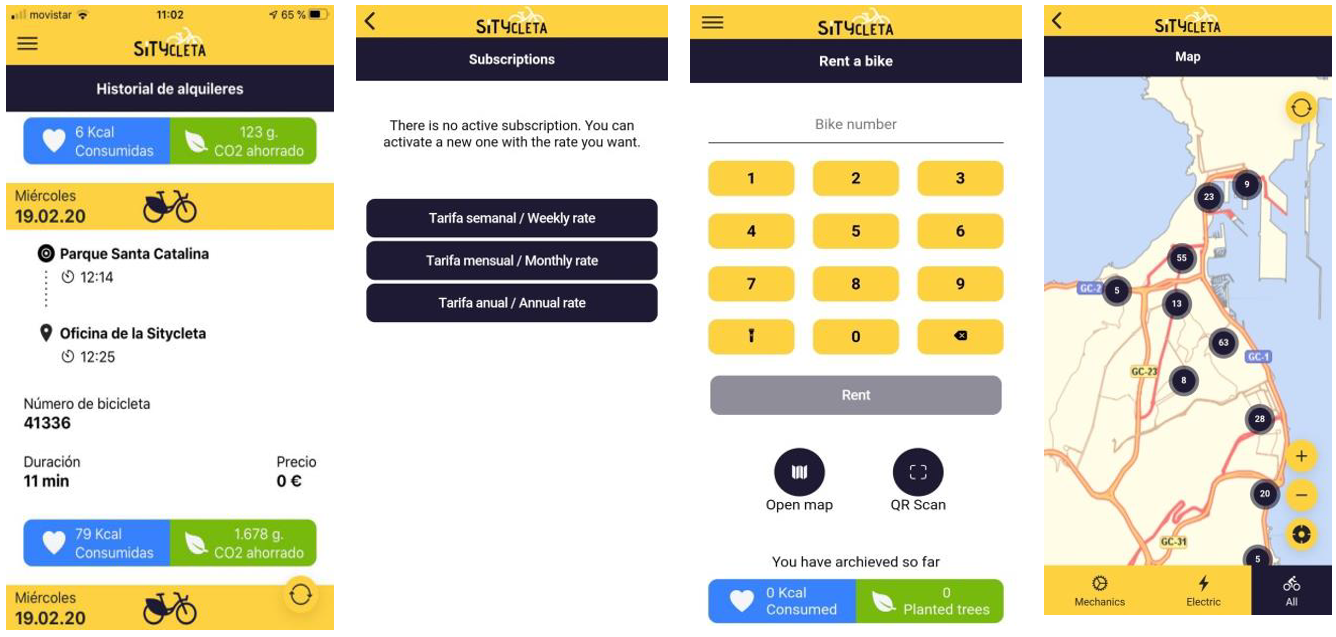Public e-bike system, app and big data tool (Las Palmas de Gran Canaria, Spain)

Area: urban
Date implemented: April 2018 (bike scheme); November 2020 (updated app); February 2021 (data tool)
How long from concept to implementation: 2-5 years
Relation between efforts undertaken and benefits achieved: good
What was done and how: Replacement of the existing bike-sharing scheme with a new one, featuring more bikes (20 e-bikes, 375 smart bikes, 2 disability accessible bikes) and 40 new stations. The sharing scheme is linked with a software platform, which includes a website, custom app, and software at the stations. This can show the available bikes, their locations, and allows to rent a bike. There are also features to encourage sustainable transport, such as information for uses about CO2 avoided per trip and number of trees "planted" by using the scheme instead of a car. The bike scheme forms part of a big data tool that collects information about mobility behaviour and travel patterns. Data sources are the bike scheme, the public bus system, the parking facilities, and anonymised mobile phone tracking data.
Why it worked to 'fast track' the innovation/measure: This was connected to other measures promoting active or sustainable transport, and improving conditions for active travel. The city promoted the scheme via social media and videos. The scheme, specifically the chosen bikes, were tailored to the target location; e-bikes were included in the mix to account for the hilly parts of the city. A custom app was developed for the system, which allowed the city to tailor the services. The city had already previously operated a bike-sharing scheme, so the local circumstances were known and could be fully accounted for. The city innitiated business sponsorship for bike stations, were businesses could advertise on their sponsored station (often near their business or in other strategic locations). A smart contactless card for the public bus system already existed, allowing the integration of the bike share scheme with the same card.
Lessons learnt: It is better to consider the specific needs of more vulnerable target groups – such as elderly people, physically impaired, etc. – from the beginning of the design stage of the project. It is very important to build up a trust with the system provider. It is crucial to engage key local stakeholders in order to fine tune the bike sharing scheme. The bike sharing scheme should take into account the shape/urban structure of the city. EU-funding is an opportunity to overcome some capital costs. Realistic milestone and goals are important, for example first focusing on the flat areas, then expanding to the hilly areas and wider city.
Tips for replication: Consider the context of the city before launching the scheme. Define realistic goals and target groups. Integrate the scheme into existing services.
Sources or links:
- https://civitas.eu/mobility-solutions/public-e-bike-system-0
- https://civitas.eu/sites/default/files/measure_evaluation_report_lpa4.1_29032021_final.pdf

Date implemented: April 2018 (bike scheme); November 2020 (updated app); February 2021 (data tool)
How long from concept to implementation: 2-5 years
Relation between efforts undertaken and benefits achieved: good
What was done and how: Replacement of the existing bike-sharing scheme with a new one, featuring more bikes (20 e-bikes, 375 smart bikes, 2 disability accessible bikes) and 40 new stations. The sharing scheme is linked with a software platform, which includes a website, custom app, and software at the stations. This can show the available bikes, their locations, and allows to rent a bike. There are also features to encourage sustainable transport, such as information for uses about CO2 avoided per trip and number of trees "planted" by using the scheme instead of a car. The bike scheme forms part of a big data tool that collects information about mobility behaviour and travel patterns. Data sources are the bike scheme, the public bus system, the parking facilities, and anonymised mobile phone tracking data.
Why it worked to 'fast track' the innovation/measure: This was connected to other measures promoting active or sustainable transport, and improving conditions for active travel. The city promoted the scheme via social media and videos. The scheme, specifically the chosen bikes, were tailored to the target location; e-bikes were included in the mix to account for the hilly parts of the city. A custom app was developed for the system, which allowed the city to tailor the services. The city had already previously operated a bike-sharing scheme, so the local circumstances were known and could be fully accounted for. The city innitiated business sponsorship for bike stations, were businesses could advertise on their sponsored station (often near their business or in other strategic locations). A smart contactless card for the public bus system already existed, allowing the integration of the bike share scheme with the same card.
Lessons learnt: It is better to consider the specific needs of more vulnerable target groups – such as elderly people, physically impaired, etc. – from the beginning of the design stage of the project. It is very important to build up a trust with the system provider. It is crucial to engage key local stakeholders in order to fine tune the bike sharing scheme. The bike sharing scheme should take into account the shape/urban structure of the city. EU-funding is an opportunity to overcome some capital costs. Realistic milestone and goals are important, for example first focusing on the flat areas, then expanding to the hilly areas and wider city.
Tips for replication: Consider the context of the city before launching the scheme. Define realistic goals and target groups. Integrate the scheme into existing services.
Sources or links:







